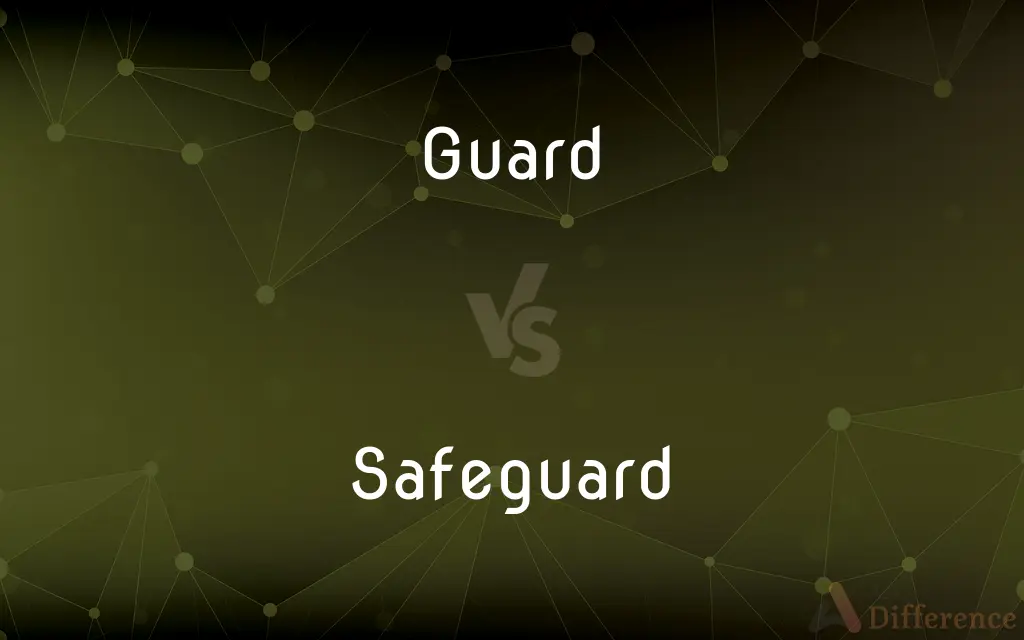Guard vs. Safeguard — What's the Difference?
By Fiza Rafique & Urooj Arif — Updated on March 12, 2024
Guard emphasizes preventive measures against threats, while safeguard often implies a protective mechanism to ensure safety or preservation.

Difference Between Guard and Safeguard
Table of Contents
ADVERTISEMENT
Key Differences
Guard often refers to a person or entity actively protecting something from harm or theft, focusing on prevention and immediate action. For example, a security guard at a bank is tasked with preventing theft or damage. Whereas safeguard typically denotes measures or devices designed to protect against accidents, errors, or other unwanted outcomes. Safeguards in a nuclear power plant, such as emergency shutdown systems, are designed to prevent catastrophic failures.
Guard can also imply a state of being watchful or vigilant against potential danger. In sports, a player might be tasked with guarding an opponent to prevent them from scoring. On the other hand, safeguard can suggest a broader range of protective strategies or mechanisms, not limited to human action. For instance, data encryption acts as a safeguard for digital information, protecting it from unauthorized access.
The term guard can be used in a more general sense, encompassing both the act of protecting and the individual or item providing protection. Guards at a museum not only prevent theft but also ensure the safety of the exhibits. Safeguard, however, usually refers to specific measures or controls implemented to ensure safety or integrity, such as safety features in cars that safeguard passengers during a crash.
In some contexts, guard involves a more active or aggressive role, where the focus is on confronting and neutralizing threats. Military guards are trained to actively engage with and neutralize threats to security. Safeguard, in contrast, might be more passive or preventive, focusing on creating barriers or systems that prevent harm without direct confrontation, like antivirus software safeguarding a computer.
While guard and safeguard both relate to protection, guard tends to imply a more immediate, direct form of protection, often involving human agents or actions. Safeguards, conversely, often refer to built-in features, practices, or policies designed to automatically provide protection or prevent harm, reflecting a more systemic approach to safety.
ADVERTISEMENT
Comparison Chart
Definition
An individual or measure aimed at preventing harm or danger, often through active watchfulness.
A measure or mechanism designed to protect against harm or ensure safety, often through systemic means.
Focus
Immediate prevention and action against threats.
Protective mechanisms or systems to ensure safety.
Usage
Often human-centric, involving physical presence or action.
Typically refers to measures, practices, or features built into systems.
Nature
More active or aggressive in preventing or confronting threats.
More passive or preventive, focusing on avoiding harm.
Contextual Example
Security guards at an event, guarding a player in sports.
Safety features in vehicles, data encryption for information security.
Compare with Definitions
Guard
Security Personnel
The guard at the bank thwarted the attempted robbery.
Safeguard
Protective Measure
Firewalls serve as a safeguard against cyber attacks.
Guard
Watchful State
The museum guard kept a vigilant watch over the priceless painting.
Safeguard
Preventive Mechanism
The safeguard system shut down the equipment before overheating.
Guard
Safety Device
The machine's guard prevented any accidental injuries.
Safeguard
Risk Mitigation Strategy
The company implemented new safeguards to protect customer information.
Guard
Protective Stance
In basketball, he was assigned to guard the opposing team's best player.
Safeguard
Safety Feature
The car's airbags are a crucial safeguard in collisions.
Guard
Defensive Position
The soldier stood guard at the entrance to the camp.
Safeguard
Security Protocol
Regular backups act as a safeguard for data loss.
Guard
Watch over in order to protect or control
The gates were guarded by soldiers
Two men were left to guard the stockade
Safeguard
A safeguard, in international law, is a restraint on international trade or economic development to protect communities from development aggression or home industries from foreign competition. In the World Trade Organization (WTO), a member may take a safeguard action, such as restricting imports of a product temporarily to protect a domestic industry from an increase in imports causing or threatening to cause injury to domestic production.
Guard
Protect against damage or harm
The company fiercely guarded its independence
Safeguard
A precautionary measure
The doctor prescribed antibiotics as a safeguard against infection.
Guard
A person who keeps watch, especially a soldier or other person assigned to protect a person or to control access to a place
A security guard
Soldiers on guard duty
Safeguard
A mechanical device designed to prevent accidents or injury.
Guard
A device worn or fitted to prevent injury or damage
A retractable blade guard
Safeguard
A protective stipulation, as in a contract.
Guard
A defensive posture that is adopted in a boxing or martial arts contest or in a fight
Before Seb could raise his guard Boz swung a wild punch
Safeguard
A safe-conduct.
Guard
An official who rides on and is in general charge of a train.
Safeguard
To ensure the safety or integrity of; protect or preserve
A strategy to safeguard the country from attack.
Investments that can help safeguard one's savings.
Guard
Each of two players either side of the centre.
Safeguard
Something that serves as a guard or protection; a defense.
Getting a flu shot is a good safeguard against illness.
Guard
To watch over (a place or person, for example) in order to keep from being damaged, robbed, or injured
Guard a bank.
Guarding a witness.
Safeguard
One who, or that which, defends or protects; defence; protection.
Guard
To supervise the entry and exit through; keep watch at
Guard a door.
Safeguard
A safe-conduct or passport, especially in time of war.
Guard
To watch over so as to prevent escape or violence
Guard a prisoner.
Safeguard
(obsolete) The monitor lizard.
Guard
To keep from risk or curtailment; ensure the safety or integrity of
Jealously guarded his success.
Carefully guarded her privacy.
Safeguard
To protect, to keep safe.
She kept a savings to safeguard against debt and emergencies.
Guard
(Sports) To keep (an opposing player) from scoring or playing effectively, usually by remaining close to the player to disrupt offensive play.
Safeguard
To implement safeguarding.
Guard
To maintain control over, as to prevent indiscretion
Guard what you say.
Safeguard
To escort safely.
Guard
To furnish (a device or object) with a part that protects people from harm or injury.
Safeguard
One who, or that which, defends or protects; defense; protection.
Thy sword, the safeguard of thy brother's throne.
Guard
(Archaic) To escort as a guard.
Safeguard
A convoy or guard to protect a traveler or property.
Guard
To take precautions
Guarded against illness by getting exercise.
Safeguard
A pass; a passport; a safe-conduct.
Guard
To serve as a guard.
Safeguard
To guard; to protect.
Guard
A person who protects, keeps watch, or acts as a sentinel
A prison guard.
Safeguard
A precautionary measure warding off impending danger or damage or injury etc.;
He put an ice pack on the injury as a precaution
An insurance policy is a good safeguard
We let our guard down
Guard
The act or duty of guarding.
Safeguard
A document or escort providing safe passage through a region especially in time of war
Guard
Protection; watch
The sheepdog kept guard over the herd.
Safeguard
Make safe
Guard
Something that gives protection; a safeguard
A guard against tooth decay.
Safeguard
Escort safely
Guard
An attachment or covering put on a machine to protect the operator or a part of the machine.
Guard
A device on a foil, sword, or knife that protects the hand.
Guard
A padded covering worn to protect a body part from injury
A shin guard.
Guard
A small chain or band attached to a watch or bracelet to prevent loss.
Guard
A ring worn to prevent a more valuable ring from sliding off the finger.
Guard
An honor guard.
Guard
Chiefly British A railway employee in charge of a train.
Guard
(Football) One of the two offensive linemen on either side of the center.
Guard
(Basketball) Either of the two players normally positioned in the backcourt who are responsible for bringing the ball to and initiating offensive plays from the frontcourt.
Guard
(Sports) A defensive position or stance, as in boxing or fencing.
Guard
(Electronics) A signal that prevents accidental activation of a device or ambiguous interpretation of data.
Guard
A person who, or thing that, protects or watches over something.
The prison guard unlocked the door of the cell.
After completing the repairs, he replaced the sump guard.
Guard
(Ireland) A garda; a police officer.
Guard
(military) A squad responsible for protecting something.
The president inspected the guard of honour.
Guard
The part of a sword that protects the wielder's hand.
Guard
A part of a machine which blocks access to dangerous parts.
The motorcycle mechanic removed the damaged chain guard.
Guard
A watchchain.
Guard
(Australia) A panel of a car that encloses the wheel area, especially the front wheels.
Guard
(uncountable) A state of caution; posture of defence.
Guard
Something worn to protect part of the body, e.g. the shins in cricket.
Guard
(basketball) A relatively short player, playing farther from the basket than a forward or centre.
Guard
(cricket) The position on the popping crease where a batsman makes a mark to align himself with the wicket; see take guard.
Guard
(American football) Either of two offensive positions between the centre and each of the offensive tackles, whose main responsibilities are to protect the quarterback, and open up "holes" through which offensive players can run.
Guard
(martial arts) A ground grappling position in which one combatant has their back to the ground while attempting to control the other combatant using their legs.
Guard
(sports) A player playing a position named guard.
Guard
(rail) An employee, normally travelling in the last vehicle of a train, responsible for the safety of the train.
Guard
A Boolean expression that must evaluate to true for a branch of program execution to continue.
Guard
(aviation) The aircraft emergency frequency, a radio frequency reserved for emergency communications, typically 121.5MHz for civilian use.
Guard
To protect from danger; to secure against surprise, attack, or injury; to keep in safety; to defend.
Guard
To keep watch over, in order to prevent escape or restrain from acts of violence, or the like.
Guard the prisoner.
Guard
To watch by way of caution or defense; to be caution; to be in a state or position of defense or safety.
Careful people guard against mistakes.
Guard
To protect the edge of, especially with an ornamental border; hence, to face or ornament with lists, laces, etc.
Guard
To fasten by binding; to gird.
Guard
To protect from danger; to secure against surprise, attack, or injury; to keep in safety; to defend; to shelter; to shield from surprise or attack; to protect by attendance; to accompany for protection; to care for.
For Heaven still guards the right.
Guard
To keep watch over, in order to prevent escape or restrain from acts of violence, or the like.
Guard
To protect the edge of, esp. with an ornamental border; hence, to face or ornament with lists, laces, etc.
Guard
To fasten by binding; to gird.
Guard
To watch by way of caution or defense; to be cautious; to be in a state or position of defense or safety; as, careful persons guard against mistakes.
Guard
One who, or that which, guards from injury, danger, exposure, or attack; defense; protection.
His greatness was no guard to bar heaven's shaft.
Guard
A man, or body of men, stationed to protect or control a person or position; a watch; a sentinel.
The guard which kept the door of the king's house.
Guard
One who has charge of a mail coach or a railway train; a conductor.
Guard
Any fixture or attachment designed to protect or secure against injury, soiling, or defacement, theft or loss
Guard
A posture of defense in fencing, and in bayonet and saber exercise.
Guard
An expression or admission intended to secure against objections or censure.
They have expressed themselves with as few guards and restrictions as I.
Guard
Watch; heed; care; attention; as, to keep guard.
Guard
The fibrous sheath which covers the phragmacone of the Belemnites.
Guard
A person who keeps watch over something or someone
Guard
The person who plays that position on a football team;
The left guard was injured on the play
Guard
A device designed to prevent injury
Guard
A posture of defence in boxing or fencing;
Keep your guard up
Guard
The person who plays the position of guard on a basketball team
Guard
A group of men who escort and protect some important person
Guard
A precautionary measure warding off impending danger or damage or injury etc.;
He put an ice pack on the injury as a precaution
An insurance policy is a good safeguard
We let our guard down
Guard
The duty of serving as a sentry;
He was on guard that night
Guard
A position on the line of scrimmage;
Guards must be good blockers
Guard
A position on a basketball team
Guard
To keep watch over;
There would be men guarding the horses
Guard
Watch over or shield from danger or harm; protect;
Guard my possessions while I'm away
Guard
Protect against a challenge or attack;
Hold that position behind the trees!
Hold the bridge against the enemy's attacks
Guard
Take precautions in order to avoid some unwanted consequence;
Guard against becoming too friendly with the staff
Guard against infection
Common Curiosities
Are safeguards always physical devices?
No, safeguards can also be procedures, protocols, or practices designed to protect against harm.
Are all safeguards infallible?
No safeguard is entirely infallible; they are designed to reduce risk but cannot eliminate it completely.
What is the primary role of a guard?
A guard primarily acts to prevent harm or danger through vigilance and active measures.
How do guards and safeguards differ in a digital context?
In a digital context, guards might refer to personnel or software actively monitoring for threats, while safeguards could be built-in security features or protocols.
How does a safeguard function?
A safeguard functions as a protective measure or mechanism designed to ensure safety and prevent harm.
Can a guard also be a measure, not just a role?
Yes, in broader terms, guard can also refer to measures or actions taken to protect something.
How do cultural or contextual factors influence the role of guards and safeguards?
Cultural and contextual factors can shape perceptions of safety and, consequently, the implementation and acceptance of guards and safeguards.
How do guards and safeguards complement each other?
Guards and safeguards often work together, with guards providing active protection and safeguards offering systemic or built-in safety features.
Can a guard be considered a safeguard?
Yes, a guard can be considered a form of safeguard when their role involves protecting or ensuring safety.
Is a guard always a person?
While often a person, a guard can also refer to objects or devices that serve a protective role, such as a railing or barrier.
Do guards always require direct intervention?
Not always; some guards, like automated surveillance systems, provide protection through monitoring and alerting rather than direct intervention.
Can safeguards be active in nature?
Yes, some safeguards, like emergency response systems, are designed to actively respond to specific threats or conditions.
What determines the selection of guards or safeguards in a specific scenario?
Factors like the nature of the threat, the value of what's being protected, and available resources influence the choice between guards and safeguards.
Is the presence of guards or safeguards always obvious?
Not necessarily; some are designed to be discreet or operate in the background, like encryption.
Can technological advancements impact the effectiveness of guards and safeguards?
Yes, advancements in technology can enhance the capabilities and effectiveness of both guards and safeguards.
Share Your Discovery

Previous Comparison
Bound vs. Bind
Next Comparison
Bouillon vs. ConsommeAuthor Spotlight
Written by
Fiza RafiqueFiza Rafique is a skilled content writer at AskDifference.com, where she meticulously refines and enhances written pieces. Drawing from her vast editorial expertise, Fiza ensures clarity, accuracy, and precision in every article. Passionate about language, she continually seeks to elevate the quality of content for readers worldwide.
Co-written by
Urooj ArifUrooj is a skilled content writer at Ask Difference, known for her exceptional ability to simplify complex topics into engaging and informative content. With a passion for research and a flair for clear, concise writing, she consistently delivers articles that resonate with our diverse audience.
















































